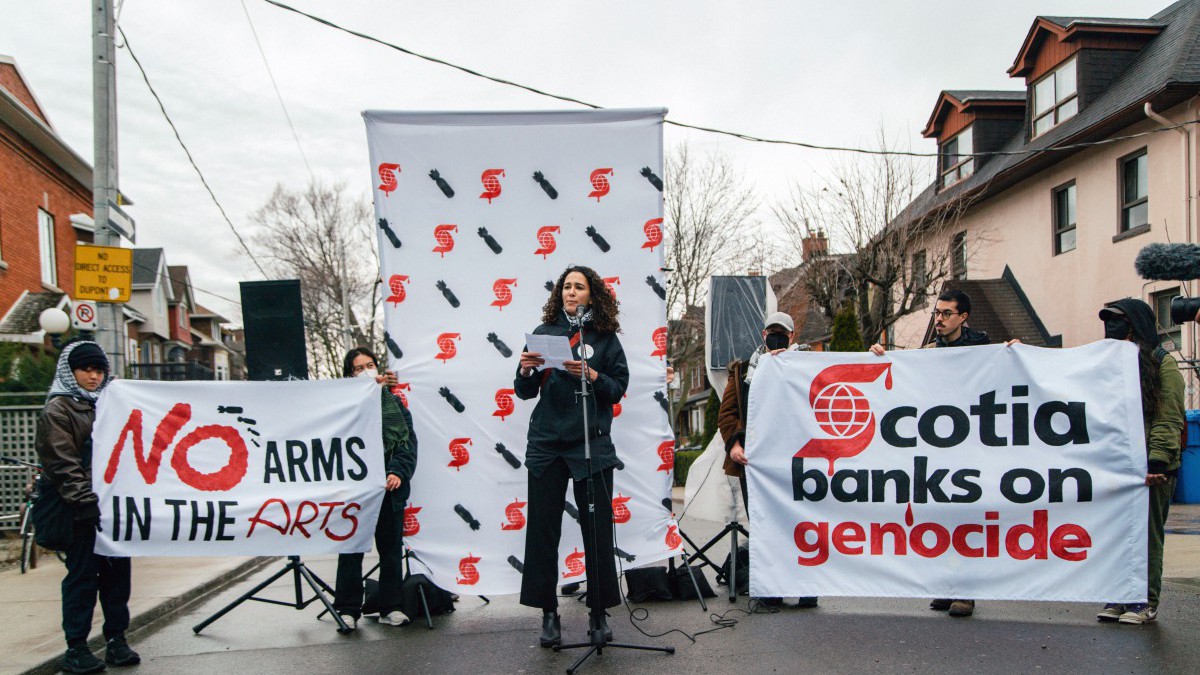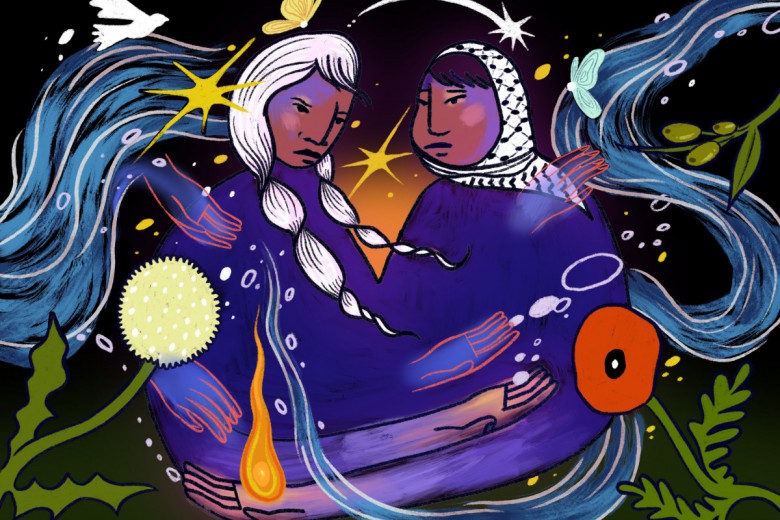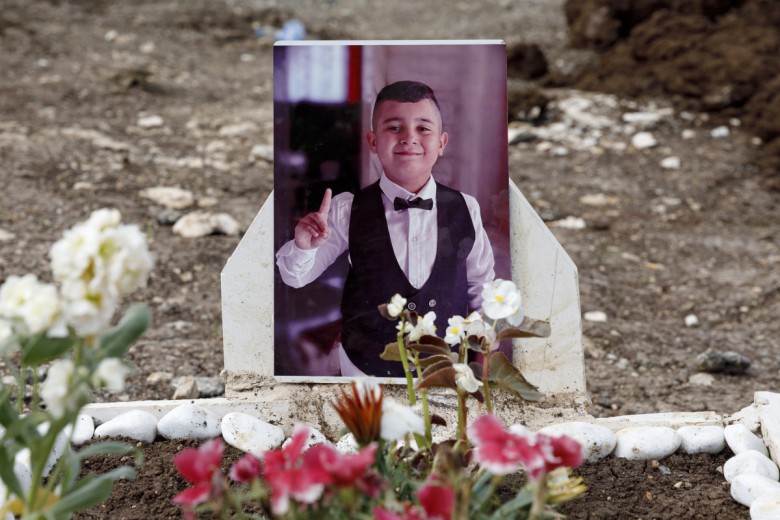On March 26, 2024, Scotiabank-sponsored Hot Docs announced its slate of festival programming to a crowd of media and industry regulars. As the scheduled remarks came to a close, dozens of artists, filmmakers, writers, and cultural workers took over the street outside the Bloor Street cinema. In front of a backdrop featuring a pattern of bloody Scotiabank logos and bombs, we launched No Arms in the Arts, a campaign to demand that the bank divest its stake in Elbit Systems, Israel’s largest weapons manufacturer – a holding then valued at US $402.1 million.
“Here today, we remind each other that the arts industries are nothing without artists,” says Thea Lim, novelist and former Giller Prize finalist, opening our press conference, “that this meagre platform of ours actually has serious weight if we stand together and we recondition ourselves to find meaning in our collective power.”
In the preceding weeks, artists waging cultural sector battles were mostly focused on challenging the censorship of Palestine solidarity at leading arts institutions. In November 2023, as Israeli forces raided Al-Shifa hospital, a handful of protesters were arrested after taking the stage during the CBC live broadcast of the 2023 Giller Prize gala. They held signs that read “Scotiabank Funds Genocide,” in order to draw attention to the fact that Scotiabank was Elbit’s largest foreign investor. A few days later, hundreds staged a sit-in at the lobby of Scotiabank’s downtown Toronto headquarters. These ad hoc initiatives were formed through a sense of urgency. Though powerful, they often lacked the structure and strategy to win broad demands that required sustained pressure.
As part of their divestment campaign, No Arms in the Arts unveils a banner in a Scotiabank theatre to alert theatre-goers of Scotiabank’s investment in Elbit weapons systems. Photo courtesy of Michael DeForge.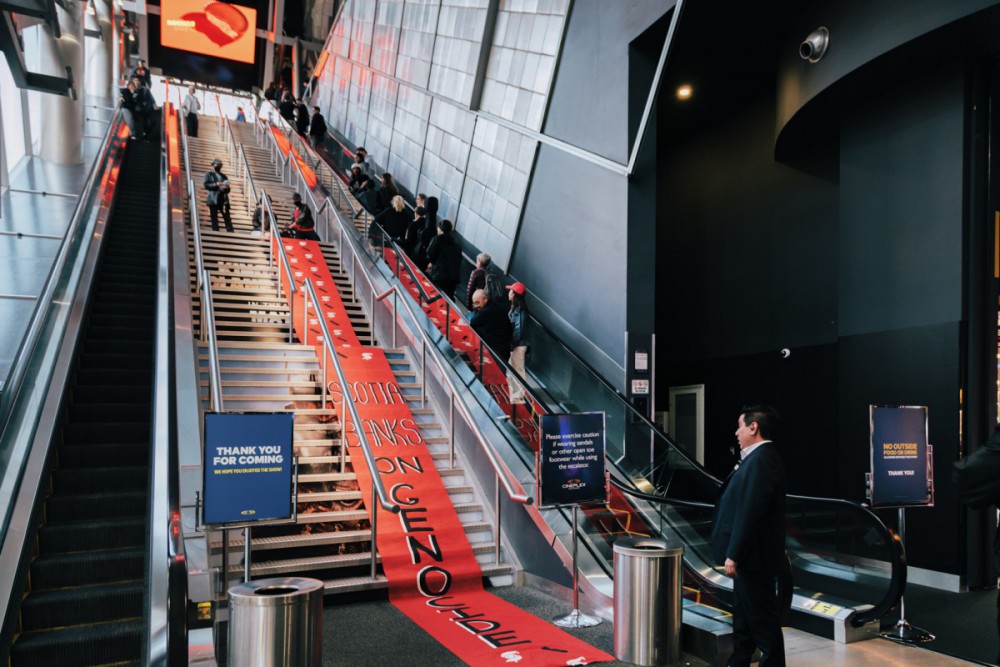
No Arms in the Arts built on that momentum by bringing these various formations together around a common target and a clear, material goal. There were several major Scotiabank-funded festivals and prizes scheduled throughout the year, which meant that we could build pressure over an extended period, bringing in more people at each juncture. By forming a loose coalition of groups which were already building a base across cultural sectors, we could adapt our tactics to suit the context. For example, because filmmakers rely on major festivals for distribution, the campaign focused on using Hot Docs’ platform to call attention to its complicit sponsor, rather than to boycott the festival entirely. Since writers don’t rely on prizes in the same way – and there are far fewer beneficiaries – a boycott of the Giller Prize was more viable. By positioning our launch against that of Hot Docs, we drew press attention from the industry event, and announced a sustained, escalatory campaign to flip the script on Scotiabank’s artwashing of its investments.
As of today, the campaign comprises a number of different groups, including: Artists Against Artwashing, CanLit Responds, Film Workers for Palestine, Musicians Against Artwashing, and Toronto Writers Against the War on Gaza.
Our work – published, exhibited, screened, accrued – makes up the raw material that arts institutions require to function. It is the collective withdrawal of our work, not only its content, that underlies our leverage in forcing institutions to reckon with our demands. Through strategic boycotts, direct actions, and collective organizing, our campaign has chipped away at the individualizing idea that artists’ political contributions are limited to their artistic creations alone.
As two initial organizers of the campaign, we are now sitting down nearly a year and a half later to reflect on our successes and failures, and chart the course ahead.
Scotiabank divestment
By late spring of 2024, our campaign had become a familiar sidebar in mainstream arts and culture stories. Renowned filmmakers had stood on Hot Docs stages, calling attention to the incongruity between the ethics of their films and its sponsor’s investment. Several artists and organizations had pulled out of their Scotiabank-funded CONTACT Photography Festival exhibitions, partnerships, and residencies. As of the end of June, Scotiabank’s asset management company had cut their original Elbit stake by over half, representing a total divestment of around US $329.4 million since October 2023.
We built this momentum through hundreds of organizing conversations with cultural workers, maintaining open lines of communication and challenging our own assumptions about who was likely to join and who could be moved.
While Scotiabank claimed the decision was unaffected by external pressure, Elbit’s CEO has attributed falling stock prices to the work of pressure campaigns in Canada, saying, “Some investors, fortunately only a few, experienced political pressures of some sort and decided to sell, for example the Canadian fund that sold a large number of shares and pushed the share price down.” After several quarters of divestment, Scotiabank retained about US $113 million of Elbit stock, about a quarter of the value of its 2023 stake.
Meanwhile, by July 2024, the Giller still hadn’t addressed the over 2,000 authors who had signed a letter calling on the prize to drop charges against the Giller protesters, or 2023 Giller Prize-winning author Sarah Bernstein’s claim that the prize had tried to stifle any mention of Palestine at her scheduled book club event, which led her to cancel.
It was only after 37 authors with 2024 prize-eligible books – along with eight former finalists and winners – boycotted the prize that the Giller was compelled to respond. In September 2024, the Giller dropped Scotiabank from its name while retaining the sponsorship, attempting to disguise performative PR as progress. Despite months of coverage aimed at undermining the boycott – including one screed for the National Post in which Conrad Black argued that the Giller “must not cave to terror-supporting elites” – the boycott swelled to hundreds of authors by early 2025. Following the departures of two 2025 prize jurors in February 2025, the Foundation announced the end of its 20-year Scotiabank partnership. Two months later, Hot Docs quietly acknowledged that Scotiabank had relinquished recognition rights for the 2025 festival, and that it would be their final year as a festival sponsor.
We built this momentum through hundreds of organizing conversations with cultural workers, maintaining open lines of communication and challenging our own assumptions about who was likely to join and who could be moved.
In order to fight against the austerity measures that have been imposed on the sector, we have to understand that arts funding isn’t driven by benevolence alone.
In CanLit Responds, many of these conversations involved thinking through questions like why we needed a boycott of the Giller Prize in order to build power toward a common set of demands, rather than passively allowing Giller and Scotiabank to part ways while leaving its other Zionist funding like Indigo Books and the Azrieli Foundation intact; or why it would be more impactful for authors to join the Giller boycott instead of holding out for the unlikely possibility of winning the prize and making a statement onstage.
“As a writer, reaching out to my fellow authors and having conversations is really where the work of organizing happens,” CanLit Responds organizer Cassidy McFadzean stresses, noting that social media posts aren’t comparable.
Former 2025 Giller juror Aaron Tucker emphasizes this point, in accounting for his departure from the jury: “I realized when I was put in conversation and actually had to speak my reasons for being on the jury aloud, that those rationales were almost immediately insufficient and weren’t nearly strong enough to justify continuing. I needed to hear myself say those things before I was able to understand I needed to leave.”
Some have argued that pressuring institutions to cut ties with genocide is pushing large sponsors out of the arts in an already precarious funding landscape. While they may be rightly concerned about the future of arts funding, these critiques ignore the decline in corporate arts sponsorship that has already been developing for over a decade. Prior to our campaign’s existence, Scotiabank had notified CONTACT Photography Festival that they would not be renewing their funding past 2024. In an article on the decision, sponsorship experts told the Globe and Mail’s Josh O’Kane that "potential sponsors are paying more attention to social causes they believe will boost their brand, while the well-heeled world of pro sports offers more eyeballs and data to prove returns on investment." What good is an arts sector that must be a reliable, safe investment to survive? In order to fight against the austerity measures that have been imposed on the sector, we have to understand that arts funding isn’t driven by benevolence alone. It’s impossible to realize our leverage if we can't identify what funders are getting in return.
Refocusing in our context
By the end of 2024, Scotiabank had changed course from previous quarters’ divestments, quietly increasing its stake in Elbit from 557,400 shares at the end of September 2024 to 700,100 shares (valued at over US $268 million by March 2025 due to increasing share prices). This comes amid Israel announcing its goal of total conquest of Palestine following Trump’s election, a sharp increase in Elbit’s profits, and commitments to increased military spending among NATO countries.
No Arms in the Arts Festival put on 11 days of programming in April and May 2024. Photo courtesy of Michael DeForge.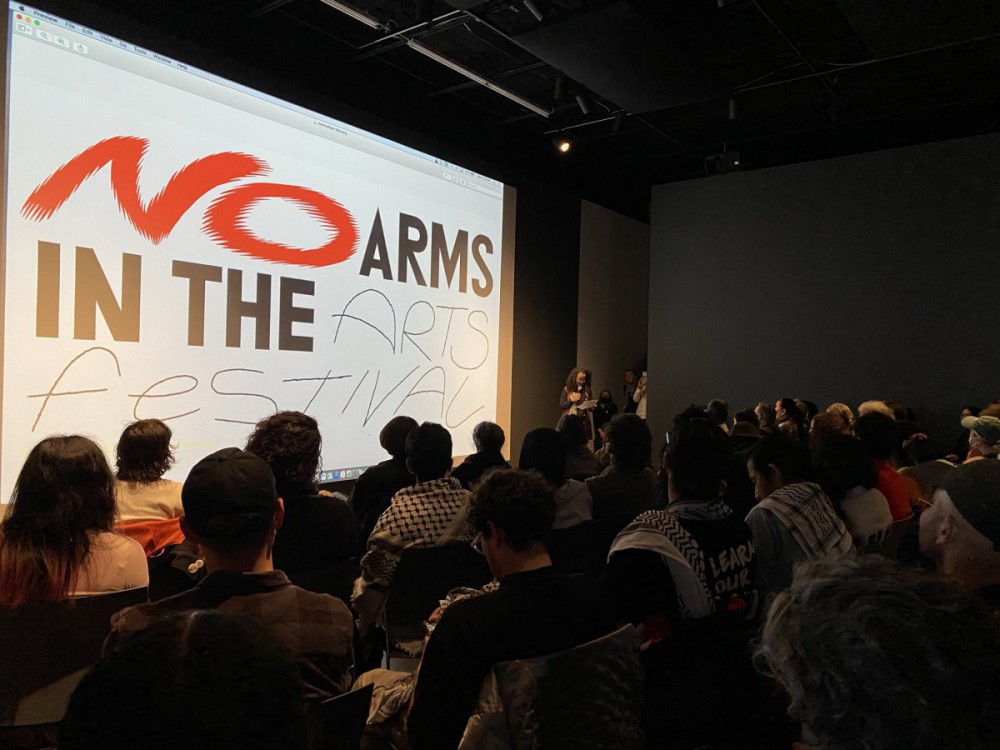
Here, we see both the uses and the limitations of a campaign that’s grown to become synonymous with a single target. Scotiabank’s 1832 Asset Management makes investment decisions regarding Elbit that are difficult for us to fully explain or predict. Even if Scotiabank were to fully divest from Elbit, another investor would buy those shares. This means that a divestment win might not affect the target company’s profits or translate directly into reduced financial and military support for Israel. Nevertheless, divestment campaigns influence standards and ethical norms around investments in arms manufacturing and in Israel – for example, earlier divestments by major European banks and pension funds brought Elbit’s international law violations into mainstream financial sector conversations, potentially constraining their access to capital.
We wanted No Arms in the Arts to be a structure within which we could fight campaigns against multiple targets with material ties to Israel, including the HESEG Foundation which supports the Israeli military through its “lone soldiers” program, and the Azrieli Foundation, a charity whose corporate arm profits from illegal West Bank settlements. We initially targeted Scotiabank for strategic reasons, but never intended it to be our sole focus.
In a recent report, Just Peace Advocates revealed that between 2019 and 2023 alone, Indigo CEO Heather Reisman and her husband Gerald Schwartz sent over $43 million to HESEG through their own private foundation. But when Indigo Books and the Azrieli Foundation were included on the Giller boycott’s list of demands, some authors were confused about why, and hesitated to sign on. One year in, we haven’t yet moved everyone who mobilized against Scotiabank toward these additional targets.
Israel is the top yearly international recipient of Canadian charitable donations, from charities and foundations whose non-profit status facilitates their ability to send millions of dollars to Israel.
Canadian charities and foundations directly funnel millions of dollars toward Israel – a paper published by Miles Howe, assistant professor in sociology at Brock University, reveals total donations in 2023 were $271 million. Israel is the top yearly international recipient of Canadian charitable donations, from charities and foundations whose non-profit status facilitates their ability to send millions of dollars to Israel. For decades, charitable status has been used by such groups to fund Zionist political objectives, which contravenes Canadian charity laws.
This gap in understanding of charities’ role in bankrolling Israel remains a challenge. This is in part because we don’t know exactly what compels the Canada Revenue Agency (CRA) to open an investigation on a given charity. The CRA claims that public pressure does not play a role, even though decades-long campaigns like the one against the Jewish National Fund of Canada have had recent successes. Howe, whose current research focuses on Zionist Canadian philanthropy, suggests that the International Court of Justice's recent ruling deeming Israel's occupation of Palestinian territories illegal may have been a factor, since it implicates member states that support it.
Nevertheless, No Arms in the Arts organizing has put pressure on art institutions like the Toronto Arts Foundation to cut ties with the Azrieli Foundation. This work has made many more people aware that the Azrieli Foundation’s namesake and sole funder is the Azrieli Group, Israel’s largest real estate company which has significant investments in Bank Leumi, an Israeli bank financing illegal settlements in Palestine; and that the foundation funds Zionist organizations like HonestReporting Canada and Im Tirtzu, a far-right Israeli organization involved in blocking aid to Gaza.
It’s critical to understand the ways these organizations insinuate themselves into the cultural conversation, in order to grasp the impact of excluding them. Reisman and Schwartz are afforded cultural legitimacy by running a supposedly benign bookseller like Indigo that is crucial for their broader project; why else would they continue to operate a franchise that has consistently recorded financial losses? That legitimacy, coupled with HESEG’s charity status, provides the cover to operate in contradiction.
Art – and artists – are often positioned as a political and ethical compass. It’s part of what makes this sector a potent space to organize, and why the state has worked so hard to depoliticize it.
Indigo markets itself as an indie-supporting bookstore with a hyper-Canadian identity, most recently forming a lobbying front with the Canadian Independent Booksellers Association against U.S. book tariffs. Meanwhile, the company has not only been part of the decimation of Canadian independent bookselling over the last two decades; it has also made independent publishers dangerously reliant on it for promotion and distribution. Reisman has positioned herself as an Oprah-like influencer within Canadian literature – highlighting authors via her “Heather’s Picks” stickers, podcasts, and public events – in a way that’s unique compared to the CEOs of other book monopolies. She fosters an image as a benevolent, progressive champion of Canadian literature, while simultaneously working to criminalize dissent against Indigo and HESEG and offering scholarships to foreigners serving in the Israeli Occupying Forces and nearly maxing out political donations to the Conservative Party of Canada in 2024.
Cultural power at scale
In 1975, the Central Intelligence Agency’s head of covert action commented, "Books differ from all other propaganda media, primarily because one book can significantly change the reader’s attitude and action to an extent unmatched by the impact of any other single medium.”
Art – and artists – are often positioned as a political and ethical compass. It’s part of what makes this sector a potent space to organize, and why the state has worked so hard to depoliticize it.
In his book On Zionist Literature, Ghassan Kanafani, a Palestinian writer, revolutionary, and member of the Popular Front for the Liberation of Palestine who was assassinated by Israeli forces in 1972, analyzes the ways in which novels have served to bolster Zionist political objectives. He claims Zionist literature serves the double purpose of both providing material for, and simultaneously justifying, Zionist writers’ racist and nationalist ideologies. This makes the publishing industry an active site of imperial politics.
As conditions worsen, how can we resist the allure of self-preservation and affirm Mohammed el-Kurd's directive to “run toward Gaza, not away from it” with the understanding that there is no 'other side’ where art can flourish on top of a siege without end, or resolution, or any accounting for what’s been lost?
Even as our campaign pressures arts organizations to cut ties with funders that materially and ideologically prop up Israel, we know that to truly contend with the influence of Zionist institutions, we need to meaningfully build alternatives. We must scale up and coordinate our disparate organizing efforts, rather than moving in ad hoc opposition from prize to prize, festival to festival.
From the 11-day No Arms in the Arts Festival counter-programming in April and May 2024 to its book clubs that have been part of the Boycott Giller campaign, artists and writers have shown that it is possible to share our work outside of prizes and festivals beholden to corporate funding or non-profit co-optation. These events were not one-off happenings, but tactics aimed at dispelling the notion that artists can only ever speak truth to power. We’re looking to build our own power instead.
In her statement to Hyperallergic on withdrawing her work from the CONTACT Photography Festival, artist Sophie Sabet said, “These are not the conditions in which I want to make art. These are not the conditions that support me as an artist or my community. This is a direct link to the genocide of so many other artists and people that are living in Gaza.”
Sabet’s comments are in line with a conversation that we continue to have with artists and cultural workers over a year later. Under what conditions can artists make work? How do we support artists – especially those who are emerging or precarious – who are not only losing work as a result of their political organizing, but also facing the brunt of increasing surveillance and repression? As conditions worsen, how can we resist the allure of self-preservation and affirm Mohammed el-Kurd's directive to “run toward Gaza, not away from it” with the understanding that there is no 'other side’ where art can flourish on top of a siege without end, or resolution, or any accounting for what’s been lost?
In 1960, Beirut hosted the Third Afro-Asian Writers’ Conference. The conference’s final resolution on Palestine called on attendees to stand against writers who had betrayed “the honour of the written word” by serving the interests of the Zionist movement; to build an anti-Zionist cultural front and take strong, material action toward Palestinian liberation.
If we want to get serious about winning, we have to recognize ourselves as cultural workers with labour power, and cultural boycotts as labour actions. We have to try – with our work, not only our words – to heed this call.


